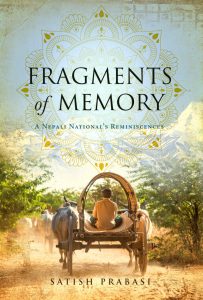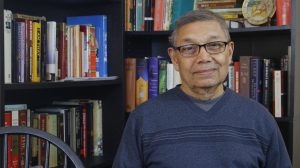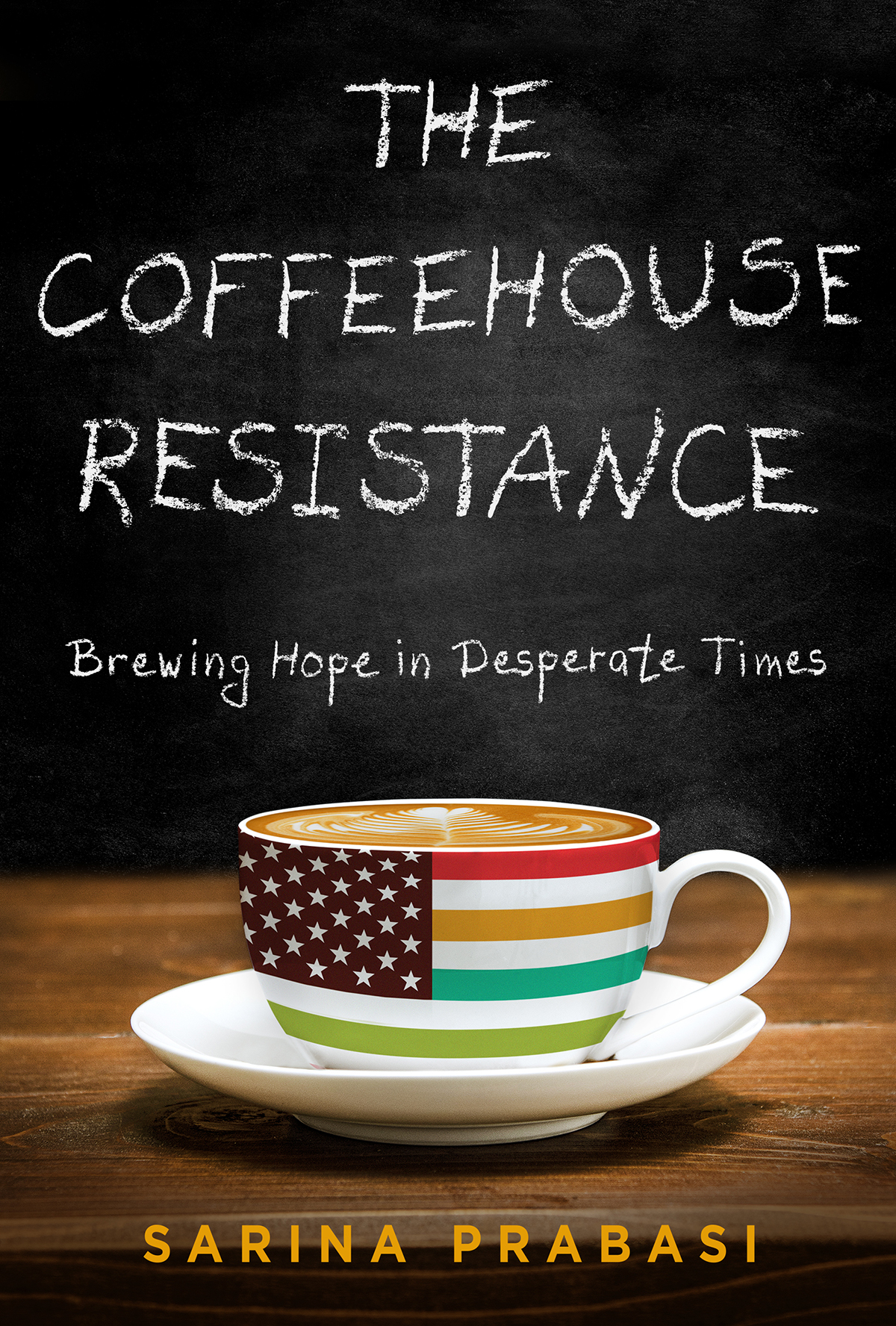I’ve had the great pleasure over the last couple of years of getting to know Satish and Sarina Prabasi—activists, travelers, immigrants, father and daughter and first time memoirists of Fragments of Memory: A Nepali National’s Reminiscences and The Coffeehouse Resistance: Brewing Hope in Desperate Times respectively. It would be impossible not to be taken with their energy, curiosity and drive. Or how timely their personal narratives feel in a world that is ever more global, yet still grudgingly moving towards a more diverse and multi-cultural future. But first and foremost, it is their writing that I am drawn to. It’s how I’ve gotten to know them and why we had the following discussion.
BEN TANZER: Please tell us who you are, your background, how you know one another and what we need to know about your book.
SATISH PRABASI: I am a citizen of Nepal currently settled in New York City, near my children and grandchildren. I was born 80 years ago, in Nepal, a country situated between two regional giants, India and China. I’ve witnessed my country’s gradual opening, from a feudal political and economic system under the pressure of democratic changes in India and revolutionary transformation in China. In my book, Fragments of Memory: A Nepali National’s Reminiscences, I write about my childhood in Nepal and India, my observations and experiences as a young student in Europe during a time of great social and political change, my later international  professional life with the UN. I wrote about Sarina’s birth and becoming a father for the first time in my book. I won a bet with the doctor when she was born, and she’s brought good fortune ever since. In addition to being an author in her own right, Sarina has also been persistent in her encouragement and support for my book. She, and my wife Sheila have been champions for my book before the first words were ever written.
professional life with the UN. I wrote about Sarina’s birth and becoming a father for the first time in my book. I won a bet with the doctor when she was born, and she’s brought good fortune ever since. In addition to being an author in her own right, Sarina has also been persistent in her encouragement and support for my book. She, and my wife Sheila have been champions for my book before the first words were ever written.
SARINA PRABASI: I’m a wearer of many hats, and a new American. My husband and I moved from Addis Ababa to New York, and I wrote a book titled The Coffeehouse Resistance: Brewing Hope in Desperate Times, about that move, and our new life in New York City. It’s part coming-to-America story, part an activist call to action. I wrote a book that has many entry points: you might discover it because you love coffee, or because you are newly politically active, or maybe because you dream of starting a small business. My book came about accidentally. When I was helping my dad with his memoir, I started writing bits and pieces, and one thing led to another.
BT: As immigrants, activists, world travelers and human beings, I’m interested in your thoughts on the importance of story in one’s life and work, and how your respective parents may have influenced your thinking about this.
SATISH: My love of travel, and my quest for learning were fueled from a young age, when my father sent me to Varanasi in India, at the age of eight, as there was no school in my village in Nepal. My father felt strongly that I should be educated, and sent me on my first journey. I write about that first trip in my book, and in a sense, I have not stopped traveling since then, nor have I lost my curiosity and love of learning. I am 80 years old now.
My activism was fueled initially by the injustices I observed—the injustice of poverty and inequality, the crushing oppression of the caste system. Later, I was influenced by the anti-war movements: the violence at Kent State University, the crushing of the “Prague Spring” in Czechoslovakia and the brutal murder of students in Tiananmen Square in Beijing all shaped my activism.
Coming back to your question of the role of story: my earliest memories have to do with my mother (who could not read) reciting passages of the Bhagavad Gita and the Ramayana that she had memorized. Not only are these important religious texts in Hinduism, they are epic tales of good and evil, of love, of jealousy, of betrayal, of war and of peace. Later, when I could read, and when I could find books, I discovered and delighted in stories from other traditions and faraway places. Books have played such an essential role in my life that I even included a list of books that shaped my thinking, in telling my own story in Fragments of Memory.
SARINA: The first stories I remember are those my mother told me. She made up elaborate tales and I never wanted these to end, and begged for more. My paternal grandmother, who lived with us in her old age, told me stories too, based on Hindu mythology, and I pestered her with questions. She was patient with me, and loving, and often rubbed my feet while telling me stories, I remember the feeling of being loved and comforted more than the details of the stories themselves.
I grew up surrounded by books. We moved around a lot, but the books came with us. I often asked my dad how many of these books he had read. There were shelves and shelves of nonfiction, biography, history, and my first love—novels. I read many of them without fully understanding them. I read voraciously. My favorite trip as a young child was to the bookstore. I loved the place, the changing displays, the children’s books in the back. The agonizing, impossible task of narrowing down my pile to the two or three books my parents had told me we could buy. I loved the feel and the smell of the books. How the pages crackled on a brand new hardcover book that had never been opened. And I joined a used bookstore/paid lending library of sorts, when I was in the second grade, and delighted in the notes, comments, and underlines others had left behind. I loved finding clues to other stories within the stories I was reading.
BT: You both speak to the role of Hindu mythology in the stories you heard as children. I suspect most Americans (such as myself) know very little about this mythology, much less Hinduism in general. What do you want people to know about Hinduism and what do you feel are some of the common misperceptions?
SATISH: I can’t speak for a whole religion, with a pantheon of gods and goddesses, different sects, and branches. My spirituality is inspired by Hindu and Buddhist philosophies and scriptures. My reverence for learning was fueled by Hinduism as it was practiced in my family in my childhood, and I talk about this in my book. I hold on to a prayer that I learned at an early age which begins: “Sarvey Bhavantu Shukhinah,” or may all people be content (or happy). There are lessons in inclusion and acceptance, that I hold dear, but I can’t say that they are widely practiced among Hindus. On the other hand, Hindu societies are male dominated and the caste system is the biggest obstacle to social mobility and progress. I see myself as a spiritual rather than religious person. I reject Hindu fundamentalism and see it as a threat —an obstacle to progress in Nepal and India, in many of the same ways as Christian fundamentalism is in the United States.
SARINA: I can’t say that I’m a practicing Hindu, but it’s the faith, and even more so, the culture that I grew up in. I am disillusioned with organized religion, and what I appreciate the most about Hindu mythology and stories is the messy plurality, the failings of the deities, and the constant presence and acknowledgement of earth, water, forest—nature in all its forms.
BT: I’m struck by the phrase “messy plurality,” though maybe I’m just struck by messy things and how we try to understand them. Please talk about how your books address the messy things in life, both yours and others, whether “messy” isn’t a strong enough descriptor for your subject matter, and what you learned while writing about these things.
SATISH: Well, first of all, if you look at my books and papers, you might find them messy, but I do have a system, or at least a logic to the mess. My story, and my life are a result of some extraordinary circumstances. Chance and luck, youthful arrogance, tradition and modernity, and a lifelong quest for learning. I have tried to make sense of all these influences and the twists and turns of my life in my memoir. Of course, we are living through a great example of the messiness of life. All of our plans have been upended by a global pandemic, and this includes a major delay in the publication of my book.
SARINA: As much as we humans like to structure and organize and control, I live by the messy plurality of life. Instead of either, or, I believe in and. In Hinduism Shiva is both creator and destroyer. The pandemic is tragic, and multilayered in what it is revealing about leadership, values, racial inequality, healthcare, and at the same time it is opening up, perhaps once in a lifetime opportunities for us to rethink and reimagine our societies and our lives. My book doesn’t neatly fall into a category. It is a memoir that jumps around from Nepal to Ethiopia to the United States. In my book, as in my life, I embrace my multiple identities, a mom, a small business owner, an immigrant, and an activist—and I try not to compartmentalize them.
BT: Both building on these responses and circling back to some of your earlier comments, what do you feel activists and artists need to focus on now and how do you think activists and artists, and all of us, can be most effective?
SATISH: Artists and activists must participate in the big picture and also the grass roots—as important, and maybe even more important than a focus on capital cities and national politics—are neighborhood groups and community organizations. The issue of inequality is an urgent one in our time. Affluence without limit is a corrupting force as we are seeing around the world.
Technology and the concentration and control of information, the takeover of smaller independent media, and the corporatization of the press have grave implications. While social media and freer flow of information might level the playing field, we are experiencing severe problems with misinformation, sensationalization, and “click-bait.” Journalism as a profession is beleaguered. These areas will require more active citizen participation and activism.
Finally, making space for the younger generation in decision-making, policy-making, in punditry, in all fields, space for under-represented and younger voices. Sometimes I find it hard to believe that I have been hearing the same people pontificate on the news, in Op-Eds, in major newspapers and magazines, for decades now. I already know their views. I’d like to learn some fresh perspectives.
SARINA: As activists, it’s essential that we are describing and able to visualize, and paint a picture of the world, the country, or the neighborhood we want to live in. The one we would be proud of, and where we feel we could fulfill our full potential as human beings. We have got to be clear about this, of the world that is possible, not only railing against what we are against, but advocating for what we are for. It’s easy to be motivated against the current administration, and I worry about the type of activism that is mostly focused on that. I’m a policy and platform person. I’ve found hope and inspiration in local and state level politics, and that’s where a lot of change can happen, where things are implemented. I’ve found inspiration in the courage of Black women and women of color in particular, but also all people we don’t traditionally hear from, or see in leadership positions.
There are no quick wins, and most activists, community organizers and movements have been working on issues of social justices for decades. We’re in a time of great disruption right now, and these are the times when big changes are possible. Taking action generates momentum and hope. Do one thing. Start where you are. For those feeling overwhelmed (including myself sometimes), I can only say, do one thing. Activism is a practice, a discipline, it’s a way of living our love and values. Action is the most hopeful thing.
BT I’m taken with these answers in general, they feel like a blueprint or roadmap for taking action, though I’m also taken with the idea that activism is “a practice, a discipline, it’s a way of living our love and values.” This sounds like a way to describe making art or writing as well. And so, as we wind-up this interview, please talk about your artistic life, how you create and what it means to you.
SATISH: In my opinion there are three core concerns embedded in this question: our artistic life, how we created it and what it means to us.
In the Trumpian age there is limited space for expanding and enhancing our artistic life. In addition, Covid-19 brought along unanticipated limits. The rules for living, social interaction, and life as we knew it have changed. Hence the outlets of expression have also shrunk. Yet the need, indeed the urgency for sustained effort to articulate and live up to our values are supremely great right now.
I am more convinced than ever, of the validity of the dictum by one of my favorite authors, Albert Camus, that “to rebel is a duty.” As writers living in the illiberal/liberal democracy we are in an acute predicament. Our constitution urges us to promote the value of the protection of life and promotion of liberty. Yet we are constrained by the rising tide of fascism and government-promoted organized violence including, often, targeted death.
One curses one’s opponents in China by saying “may you live in interesting times.” And these are interesting times, indeed. This age of uncertainty and increasing level of extremism makes us ponder over Albert Camus’s seminal essay titled “Reflections on the Guillotine” where he says, “Hurled into the unregulated dynamism of History  one needs new laws of equilibrium. He needs a reasonable society, not the anarchy into which his own pride and the State’s inordinate powers has plunged him.”
one needs new laws of equilibrium. He needs a reasonable society, not the anarchy into which his own pride and the State’s inordinate powers has plunged him.”
SARINA: Art has never felt more necessary to me. During the pandemic, and in the political turmoil of our times, I am even more drawn to art, to the people who are creating, music, visual art, poetry, all kinds of words. Yet, how practically impossible our society continues to make a life of art. I marvel at the courage it takes to choose a life of art, when that path is made so difficult, by the hierarchy of work and what is valued (and paid) in American society.
In my own life, reading and writing have been central since childhood, but more as personal pleasures rather than a public profession. That was a big shift for me in the last couple of years, where I allowed myself the possibility that I might write more publicly, and when my book came out last year. I am still working on creating more of a writing life. On the work and discipline of it, of creating a daily practice. Right now, writing is what I escape to, getting away for a few hours from my other responsibilities. I’m working on enlarging that time. 
